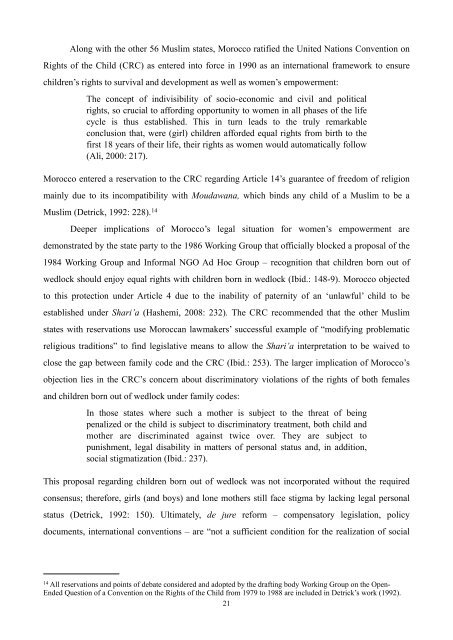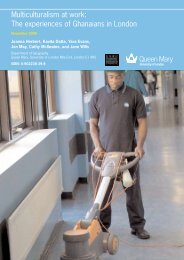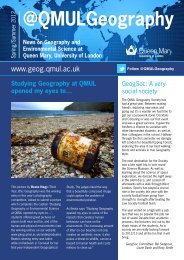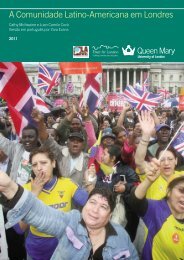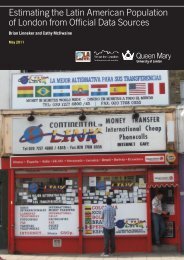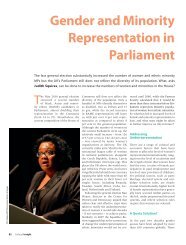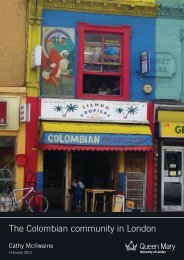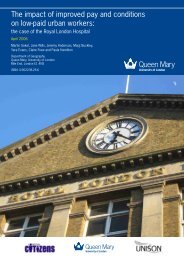Women's Empowerment and the Feminization of Poverty among
Women's Empowerment and the Feminization of Poverty among
Women's Empowerment and the Feminization of Poverty among
- No tags were found...
Create successful ePaper yourself
Turn your PDF publications into a flip-book with our unique Google optimized e-Paper software.
Along with <strong>the</strong> o<strong>the</strong>r 56 Muslim states, Morocco ratified <strong>the</strong> United Nations Convention onRights <strong>of</strong> <strong>the</strong> Child (CRC) as entered into force in 1990 as an international framework to ensurechildren’s rights to survival <strong>and</strong> development as well as women’s empowerment:The concept <strong>of</strong> indivisibility <strong>of</strong> socio-economic <strong>and</strong> civil <strong>and</strong> politicalrights, so crucial to affording opportunity to women in all phases <strong>of</strong> <strong>the</strong> lifecycle is thus established. This in turn leads to <strong>the</strong> truly remarkableconclusion that, were (girl) children afforded equal rights from birth to <strong>the</strong>first 18 years <strong>of</strong> <strong>the</strong>ir life, <strong>the</strong>ir rights as women would automatically follow(Ali, 2000: 217).Morocco entered a reservation to <strong>the</strong> CRC regarding Article 14’s guarantee <strong>of</strong> freedom <strong>of</strong> religionmainly due to its incompatibility with Moudawana, which binds any child <strong>of</strong> a Muslim to be aMuslim (Detrick, 1992: 228). 14Deeper implications <strong>of</strong> Morocco’s legal situation for women’s empowerment aredemonstrated by <strong>the</strong> state party to <strong>the</strong> 1986 Working Group that <strong>of</strong>ficially blocked a proposal <strong>of</strong> <strong>the</strong>1984 Working Group <strong>and</strong> Informal NGO Ad Hoc Group – recognition that children born out <strong>of</strong>wedlock should enjoy equal rights with children born in wedlock (Ibid.: 148-9). Morocco objectedto this protection under Article 4 due to <strong>the</strong> inability <strong>of</strong> paternity <strong>of</strong> an ‘unlawful’ child to beestablished under Shari’a (Hashemi, 2008: 232). The CRC recommended that <strong>the</strong> o<strong>the</strong>r Muslimstates with reservations use Moroccan lawmakers’ successful example <strong>of</strong> “modifying problematicreligious traditions” to find legislative means to allow <strong>the</strong> Shari’a interpretation to be waived toclose <strong>the</strong> gap between family code <strong>and</strong> <strong>the</strong> CRC (Ibid.: 253). The larger implication <strong>of</strong> Morocco’sobjection lies in <strong>the</strong> CRC’s concern about discriminatory violations <strong>of</strong> <strong>the</strong> rights <strong>of</strong> both females<strong>and</strong> children born out <strong>of</strong> wedlock under family codes:In those states where such a mo<strong>the</strong>r is subject to <strong>the</strong> threat <strong>of</strong> beingpenalized or <strong>the</strong> child is subject to discriminatory treatment, both child <strong>and</strong>mo<strong>the</strong>r are discriminated against twice over. They are subject topunishment, legal disability in matters <strong>of</strong> personal status <strong>and</strong>, in addition,social stigmatization (Ibid.: 237).This proposal regarding children born out <strong>of</strong> wedlock was not incorporated without <strong>the</strong> requiredconsensus; <strong>the</strong>refore, girls (<strong>and</strong> boys) <strong>and</strong> lone mo<strong>the</strong>rs still face stigma by lacking legal personalstatus (Detrick, 1992: 150). Ultimately, de jure reform – compensatory legislation, policydocuments, international conventions – are “not a sufficient condition for <strong>the</strong> realization <strong>of</strong> social14All reservations <strong>and</strong> points <strong>of</strong> debate considered <strong>and</strong> adopted by <strong>the</strong> drafting body Working Group on <strong>the</strong> Open-Ended Question <strong>of</strong> a Convention on <strong>the</strong> Rights <strong>of</strong> <strong>the</strong> Child from 1979 to 1988 are included in Detrick’s work (1992).21


